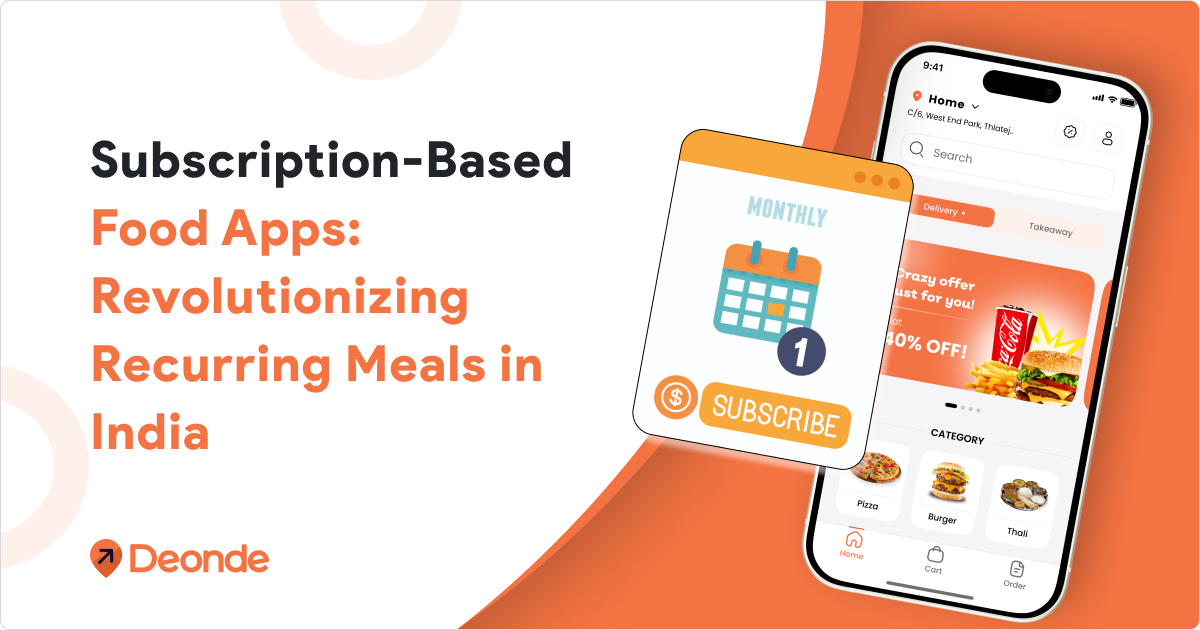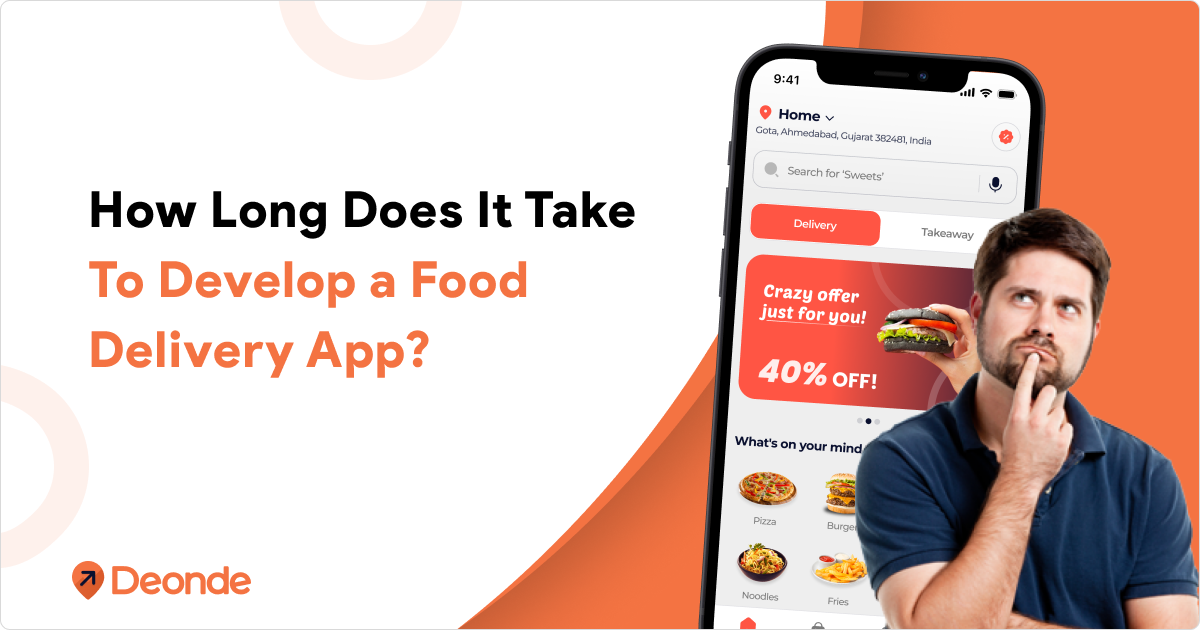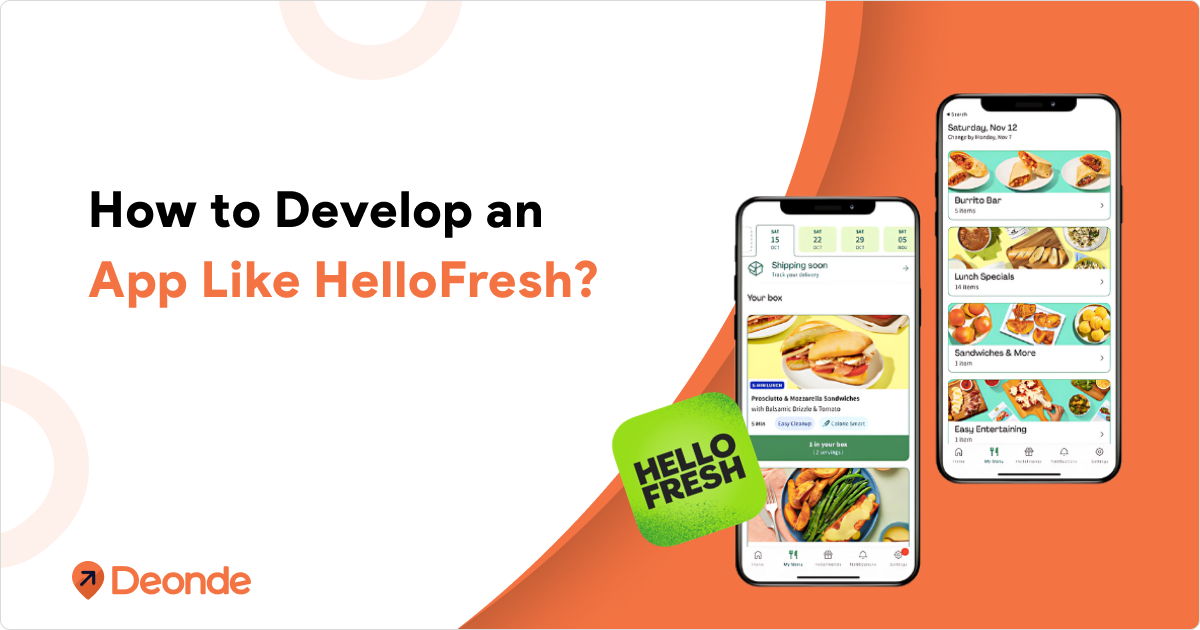The demand for consistent and convenient meal solutions is soaring in India’s fast-paced lifestyle. A subscription-based food app isn’t just another delivery service; it’s a strategic model designed for recurring meals, offering predictability and convenience. For Indian startups, this model presents a unique opportunity to capture a loyal customer base and build a sustainable business.
This blog explores the subscription-based food app model, its key features, and why it’s an ideal solution for Indian startups. We’ll also look at successful examples, future trends, and how Deonde can help you launch and scale your subscription-based food app.
Understanding the Subscription-Based Food App Model
Unlike traditional on-demand delivery, a subscription-based food app focuses on providing scheduled, recurring meal services. This model caters to individuals and businesses seeking regular meal solutions, such as daily lunches, weekly meal plans, or consistent delivery of specialized dietary options. This predictability creates a stable revenue stream and fosters long-term customer relationships.
Key Features of a Successful Subscription-Based Food App
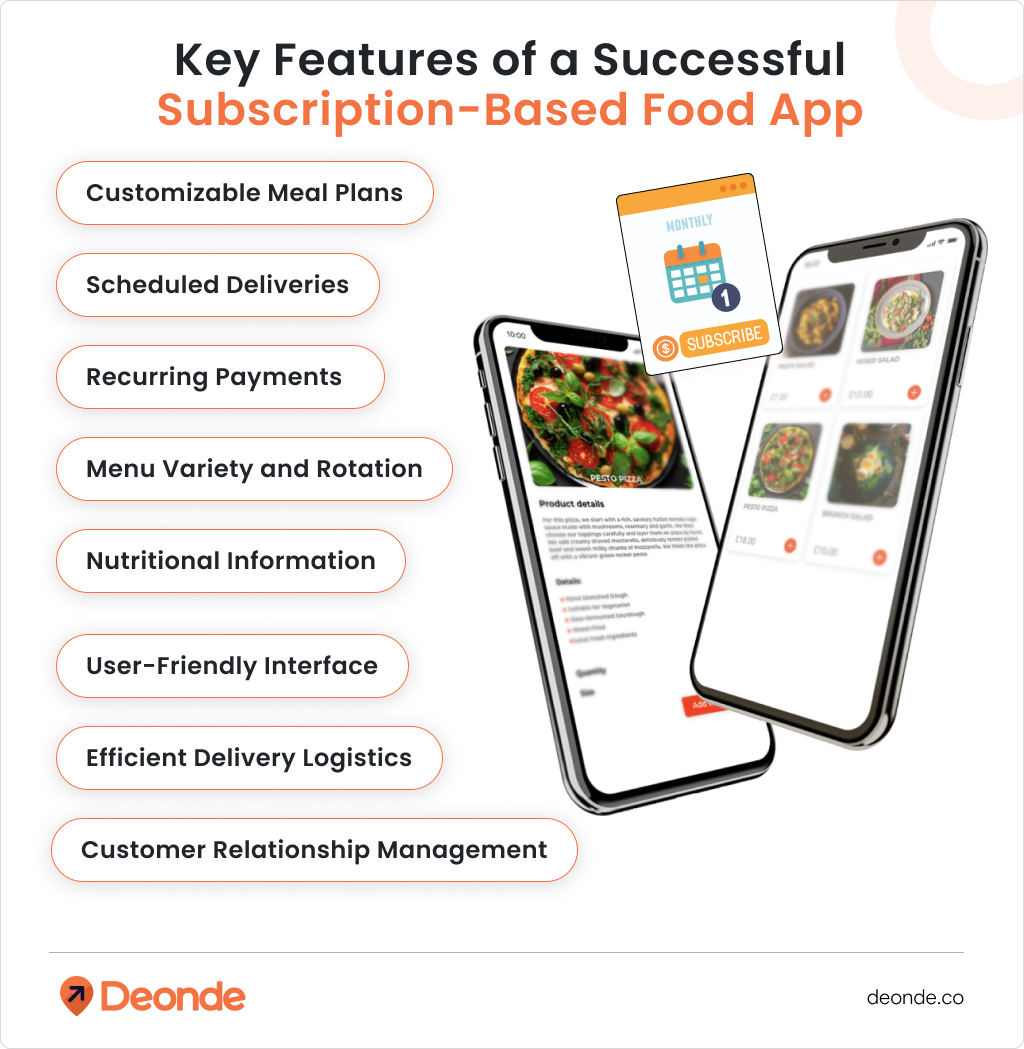
To stand out in the competitive food delivery market, a subscription-based food app must offer the following features:
1. Customizable Meal Plans: One of the most critical features of a subscription-based food app is the ability to offer customizable meal plans. Consumers have diverse dietary needs and preferences, and the app should allow them to tailor their meal plans accordingly. Whether vegetarian, vegan, gluten-free, or keto, the app should cater to various dietary requirements.
2. Scheduled Deliveries: Timely and reliable deliveries are essential for customer satisfaction. A robust scheduling system ensures that meals are delivered at the right time, every time. This feature is significant for office-goers who rely on timely lunch deliveries.
3. Recurring Payments: A seamless and secure recurring payment system is crucial for the subscription model. The app should offer multiple payment options and ensure that the payment process is hassle-free. Automatic billing and reminders can reduce payment defaults and improve cash flow.
4. Menu Variety and Rotation: The app should offer a diverse menu with regular updates to keep customers engaged and satisfied. A rotating menu prevents monotony and encourages customers to continue their subscriptions. Seasonal ingredients and unique dishes can add excitement to the meal plans.
5. Nutritional Information: Health-conscious consumers appreciate detailed dietary information for each meal. The app should provide comprehensive details about calories, macronutrients, and allergens. This transparency helps customers make informed choices and aligns with the growing trend of mindful eating.
6. User-Friendly Interface: A well-designed, intuitive app interface enhances the user experience. Easy navigation, clear instructions, and a visually appealing layout can make the app more engaging and user-friendly. Features like meal customization, delivery scheduling, and payment options should be easily accessible.
7. Efficient Delivery Logistics: Efficient delivery logistics are critical for the success of a subscription-based food app. Optimizing delivery routes, using real-time tracking, and ensuring timely deliveries can significantly improve customer satisfaction. Partnering with reliable delivery services or building an in-house delivery network can help achieve this.
8. Customer Relationship Management (CRM): A robust CRM system helps manage customer data, track preferences, and personalize the user experience. It also aids in customer retention by enabling targeted marketing campaigns, loyalty programs, and personalized offers.
Why the Subscription Model is Ideal for Indian Startups
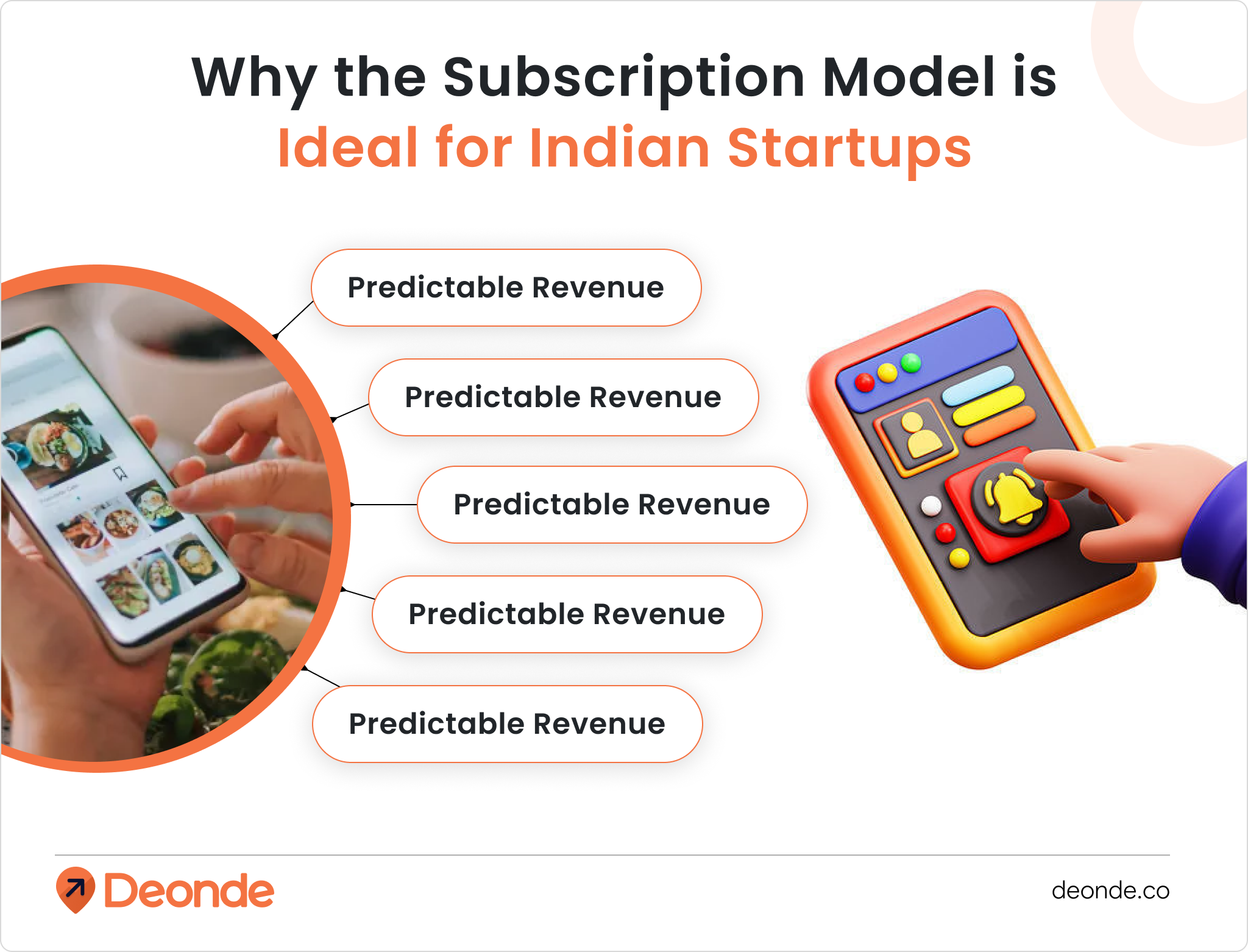
India’s food delivery market is booming, and subscription-based models offer several advantages for startups:
Predictable Revenue: The subscription model offers a predictable and steady revenue stream, which is crucial for startups’ financial stability. Recurring payments ensure a consistent cash flow, allowing businesses to plan and invest in growth.
Customer Loyalty: Subscription-based models foster long-term customer relationships. By providing consistent value and personalized experiences, startups can build a loyal customer base that is less likely to switch to competitors.
Niche Market Targeting: The subscription model allows startups to target specific niche markets. Whether it’s health-conscious individuals, busy professionals, or people with specific dietary needs, startups can tailor their offerings to meet the unique demands of these segments.
Operational Efficiency: Scheduled deliveries streamline operations and reduce the unpredictability of on-demand services. This efficiency translates to cost savings and better resource utilization.
Growing Demand: The demand for convenient and healthy meal solutions is rising in India. With increasing urbanization, busy lifestyles, and a growing awareness of health and nutrition, subscription-based food apps are well-positioned to capitalize on this trend
Successful Examples of Subscription-Based Food Models in India
Several Indian startups have successfully implemented the subscription-based food model:
1. Cookr
Cookr delivers home-cooked meals through customizable subscription plans. Its focus on quality and convenience has made it a favourite among urban professionals.
2. Mealawe
Mealawe specializes in affordable and flexible homemade meal subscriptions. Its rotating menu and emphasis on affordability have helped it gain a loyal customer base.
3. MyKhaana
MyKhaana operates as a marketplace for home chefs and bakers, offering subscription options for regular meal deliveries. Its community-driven approach sets it apart from traditional food delivery services.
4. TiffinBox
TiffinBox specializes in authentic home-style tiffin services with flexible subscription options. Their focus on traditional Indian meals delivered in eco-friendly packaging has made them popular among working professionals and students who crave homemade food without the hassle of cooking.
The Impact of Subscription-Based Food Apps on the Food Industry
Subscription-based food apps are reshaping the way Indians think about food consumption. By offering a convenient, hassle-free solution for recurring meals, these apps encourage consumers to move from traditional home-cooked and restaurant dining to a more modern, tech-driven approach to food consumption.
Convenience
One of the primary reasons consumers are drawn to subscription-based food apps is the convenience they offer. With just a few clicks, customers can subscribe to a meal plan that suits their dietary preferences and lifestyle and have their meals delivered to their doorstep regularly. This eliminates the need for grocery shopping, meal planning, and cooking, saving consumers time and effort.
Personalization:
Subscription-based food apps allow customers to customize their meal plans based on their dietary preferences, nutritional needs, and taste preferences. This level of personalization is particularly appealing to health-conscious consumers, fitness enthusiasts, and those with specific dietary restrictions.
Cost-Effectiveness:
While subscription-based meal plans may seem expensive initially, they can be more cost-effective than eating out or ordering food from restaurants regularly. By subscribing to a meal plan, customers can save money on groceries, reduce food waste, and avoid the high costs associated with dining out.
Health and Wellness:
With the growing emphasis on health and wellness, many consumers turn to subscription-based food apps to maintain a healthy diet. These apps offer meal plans designed by nutritionists and fitness experts, ensuring customers receive balanced, nutritious meals supporting their health goals.
Future Trends in Subscription-Based Food Apps
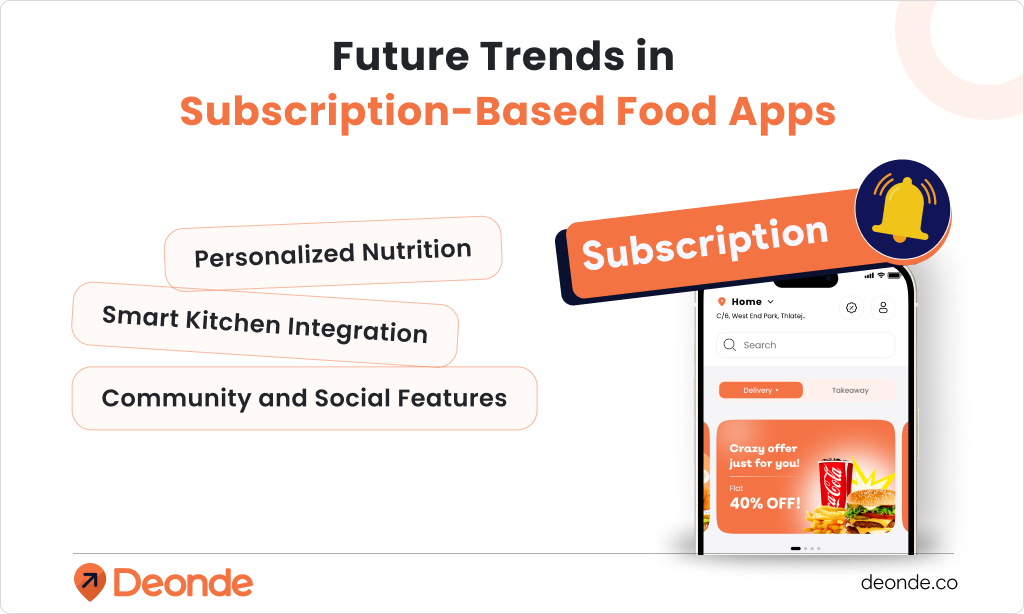
Personalized Nutrition
The future of subscription-based food apps lies in personalized nutrition. Catering to individual dietary needs, preferences, and health goals can provide a competitive edge. Advanced AI algorithms and data analytics can enable hyper-personalized meal plans and recommendations.
Smart Kitchen Integration
Exploring integration with smart kitchen appliances can enhance the user experience. Smart ovens, meal prep devices, and connected kitchen gadgets can streamline meal preparation and increase customer convenience.
Community and Social Features
Building community features within the app can foster a sense of belonging and engagement. Features like user forums, recipe sharing, and social media integration can create a vibrant community of food enthusiasts.
Why Choose Deonde?
Deonde, we specialize in developing tailored subscription-based food app solutions that empower Indian startups. Our platforms are designed for flexibility, scalability, and efficiency, ensuring a seamless launch and sustainable growth in the recurring meal market. With our expertise and commitment to innovation, we help startups navigate the challenges of the food industry and achieve long-term success.
Conclusion
Subscription-based food apps are transforming the way Indians approach meal planning and delivery. By offering predictability, convenience, and personalization, these apps cater to the evolving needs of urban consumers. For Indian startups, this model presents a unique opportunity to build a sustainable and profitable business. With the right strategy, technology, and execution, subscription-based food apps can become a cornerstone of India’s food industry. And with Deonde, you’re well-equipped to succeed in this exciting journey.
Ready to launch your subscription-based food app and tap into India’s growing demand for recurring meal solutions? Contact Deonde today to explore our tailored solutions and take your business to the next level. Let’s build a sustainable and profitable future together!
Also Read:

